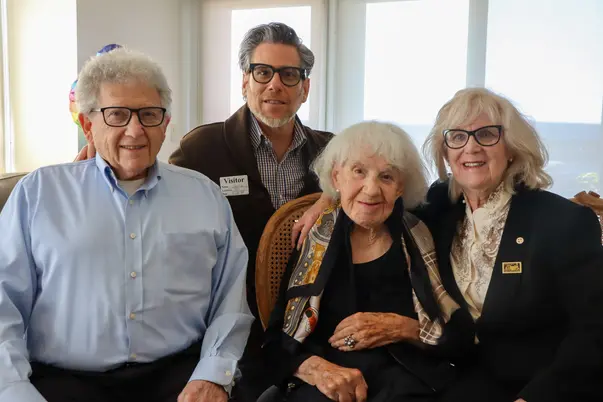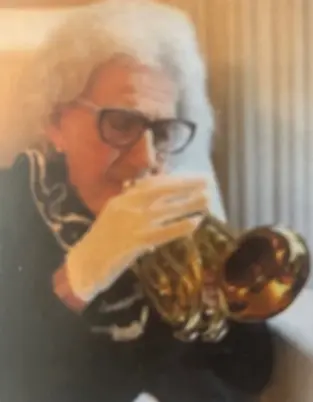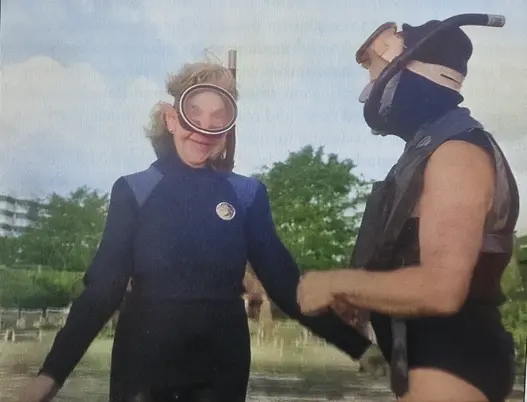At 108, Los Angeles Jewish Health Resident Continues to Thrive


At 108, Los Angeles Jewish Health Resident Continues to Thrive

When Fountainview at Gonda Westside resident Shirley Groner was born in June 1915, the average life expectancy was 54 years. The idea of doubling that lifespan would have been inconceivable – and yet, 108 years later, Shirley is still going strong.
The third of four sisters born and raised in the Chicago area, Shirley was a natural athlete – a talented swimmer and diver who brought the same passion and energy she displayed in the water to everything she did. It was that desire to jump in and experience life fully that led her to San Francisco as a young woman, where in a matter of months, she met and got engaged to her husband, Harold. They were together for 59 years, building a family and a life together that infused their partnership with love, fulfillment, and joy.
Their daughter, Wendy Groner Strauss (who with her husband, Michael Strauss, also lives at Fountainview at Gonda Westside), says Shirley has always been a force of nature.
“Mom is curious and engaged, and throughout her life she leaned into every opportunity,” Wendy notes. “If there was somewhere to go, she went; a place to explore, she seized the chance; people to talk to, she started chatting. I think being such a doer has helped keep her going all these years.”
In addition to raising Wendy and her two brothers, Wayne and Brian, Shirley was constantly on the move, whether it was knitting sweaters for US soldiers, participating in Hadassah and B’nai Brith, or serving as president of the San Francisco chapter of City of Hope. She also embraced the arts, frequently attending ballet performances, writing her own poetry, and soaking up musical theater productions. Music was central to her identity, and she delighted in playing the cornet, a brass instrument similar to the trumpet.

Although Harold’s passing in 2000 was difficult to bear, Shirley moved forward with her typical vigor, traveling frequently between Southern California and the East Coast to visit her 10 grandchildren, 53 great-grandchildren, and 24 great-great grandchildren.
“Bubba is a fixture in my life. I have so many wonderful memories of spending time with her when I was growing up, not only at our house in Orange County but also traveling abroad,” says grandson Sasha Strauss. “She’s stylish and creative, and so open to new things. Whenever she had a chance for adventure, she would say ‘yes,’ and in that way (and so many others) she’s really a role model for me.”
Embracing adventure has taken Shirley around the world, including Israel, Mexico, New Zealand, Curacao, Honduras, Italy, the Seychelle Islands, and beyond. She has even been mushing with Alaskan huskies in Colorado in 32-degree-below-zero conditions! On a number of trips, she channeled her love of swimming into skindiving with her son-in-law, Michael, an orthopaedist and wound care specialist who spent over three decades traversing the globe as a doctor for the Navy SEALs.
“Shirley is bold, there’s no question about it,” Michael says. “She’s also indefatigable: She would frequently accompany me to American Academy of Orthopaedic Surgeons meetings, spearheading some of the group’s charitable activities by helping to build playgrounds in cities from San Francisco to Washington, DC.”
For years, Shirley lived in a senior living community in San Francisco, but during COVID, she headed south to be closer to Wendy and Michael and their sons, Sasha, an expert in brand strategy and a professor at USC and UCLA, and Ari, an electrical engineer. Wendy, still a working pharmacist, and Michael, an active LA-area surgeon, had been poised to take up residence at Fountainview at Gonda Westside when Shirley made the move to Los Angeles, and they were successful in securing her a spot, as well.
“Living at Fountainview at Gonda Westside has been great for Mom: She frequently attends lectures and plays dominoes every night,” Wendy says. “Sometimes, she wins!”
Sasha was recently a Fountainview at Gonda Westside guest lecturer, and he was proud to have his grandmother in the front row. “I spoke for a couple of hours, and Bubba was following along and keeping up the entire time, even more so than many of the other, much younger, attendees,” he says. “To have that kind of ability at 108 is nothing short of astonishing.”
From her perspective, Shirley agrees that staying active has been central to her ability to thrive. But she has other ideas about what may be fueling her longevity, as well.
“Healthy food helps,” she says. “Also, having a lot of love.”
